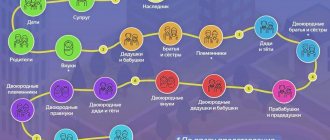Legal capacity of minors aged 14 to 18 years. Rules for transactions with the property of minors aged 14 to 18 years. Powers of guardianship and trusteeship authorities. (Articles 26, 27, 34, 172 of the Civil Code; Law on Guardianship Federal Law-48 of April 24, 2008), paragraph 3 of Art. 60 of the Family Code) Article 21 of the Civil Code of the Russian Federation. Legal capacity of a citizen 1. The ability of a citizen, through his actions, to acquire and exercise civil rights, to create civil responsibilities for himself and to fulfill them (civil capacity) arises in full with the onset of adulthood, that is, upon reaching the age of eighteen. 2. In cases where the law allows marriage before the age of eighteen, a citizen who has not reached the age of eighteen acquires full legal capacity from the time of marriage. The legal capacity acquired as a result of marriage is retained in full even in the event of divorce before reaching the age of eighteen.
If a marriage is declared invalid, the court may decide that the minor spouse loses full legal capacity from the moment determined by the court.
Article 26 of the Civil Code of the Russian Federation. Legal capacity of minors aged from fourteen to eighteen years 1. Minors aged from fourteen to eighteen years make transactions, with the exception of those mentioned in paragraph 2 of this article, with the written consent of their legal representatives - parents, adoptive parents or guardian. A transaction made by such a minor is also valid with its subsequent written approval by his parents, adoptive parents or guardian. 2. Minors aged fourteen to eighteen years have the right to independently, without the consent of parents, adoptive parents and guardians: 1) manage their earnings, scholarships and other income; 2) exercise the rights of the author of a work of science, literature or art, invention or other result of his intellectual activity protected by law; 3) in accordance with the law, make deposits in credit organizations and manage them; 4) make small household transactions and other transactions provided for in paragraph 2 of Article 28 of this Code. Upon reaching the age of sixteen, minors are also eligible to be members of cooperatives in accordance with cooperative laws. 3. Minors aged fourteen to eighteen years independently bear property liability for transactions made by them in accordance with paragraphs 1 and 2 of this article. For the harm caused by them, such minors are liable in accordance with this Code. 4. If there are sufficient grounds, the court, at the request of parents, adoptive parents or a trustee or a guardianship and trusteeship body, may limit or deprive a minor aged fourteen to eighteen years of the right to independently dispose of his earnings, scholarship or other income, except for cases where such a minor has acquired full legal capacity in accordance with paragraph 2 of Article 21 or Article 27 of this Code. Article 27. Emancipation 1. A minor who has reached the age of sixteen may be declared fully capable if he works under an employment contract, including a contract, or with the consent of his parents, adoptive parents or guardian is engaged in entrepreneurial activity. A minor is declared fully capable (emancipation) by decision of the guardianship and trusteeship authority - with the consent of both parents, adoptive parents or trustee, or in the absence of such consent - by a court decision. 2. Parents, adoptive parents and guardians are not liable for the obligations of an emancipated minor, in particular for obligations arising as a result of harm caused to them. However, if a minor does not have property or earnings sufficient to compensate for the harm, the harm in the appropriate part must be compensated by his parents (adoptive parents, guardian), unless they prove that the harm did not arise through their fault (Article 1073 of the Civil Code). A transaction made by a minor aged 14 to 18 years without the consent of his parents, adoptive parents or guardian, in cases where such consent is required in accordance with Article 26 of the Civil Code, may be declared invalid by the court at the claim of the parents, adoptive parents or guardian Article 8. Powers guardianship and trusteeship authorities (dated 04/24/2008 N 48-FZ “On guardianship and trusteeship”) 1. The powers of guardianship and trusteeship authorities include: 1) identification and registration of citizens who need to have guardianship or trusteeship established over them; 2) applying to the court to recognize a citizen as incompetent or to limit his legal capacity, as well as to recognize a ward as capable if the grounds on which the citizen was declared incompetent or was limited in his legal capacity no longer exist; 3) establishment of guardianship or trusteeship; 4) exercising supervision over the activities of guardians and trustees, the activities of organizations in which incompetent or partially incompetent citizens are placed; 5) release and removal in accordance with this Federal Law of guardians and trustees from the performance of their duties; 6) issuance, in accordance with this Federal Law, of permits to carry out transactions with the property of wards; 7) conclusion of trust management agreements for the property of wards in accordance with Article 38 of the Civil Code of the Russian Federation; representation of the legitimate interests of minors and incapacitated citizens under guardianship or trusteeship in relations with any persons (including in the courts), if the actions of guardians or trustees to represent the legitimate interests of wards contradict the legislation of the Russian Federation and (or) the legislation of the constituent entities of the Russian Federation or the interests of the wards or if the guardians or trustees do not protect the legitimate interests of the wards; 9) issuance of permission for the separation of trustees and their minor wards in accordance with Article 36 of the Civil Code of the Russian Federation; 10) selection, registration and preparation, in the manner determined by the Government of the Russian Federation, of citizens who have expressed a desire to become guardians or trustees or to accept children left without parental care into the family for upbringing in other forms established by family legislation; 11) checking the living conditions of wards, compliance by guardians and trustees with the rights and legitimate interests of wards, ensuring the safety of their property, as well as the fulfillment by guardians and trustees of the requirements for the exercise of their rights and the fulfillment of the duties of guardians or trustees, determined in accordance with Part 4 of Article 15 of this Federal law; 12) informing citizens who have expressed a desire to become guardians or trustees or to accept a child left without parental care to be raised in a family in other forms established by family legislation, about possible forms of placing a child in a family, about the features of certain forms of placing a child in a family, about the procedure preparation of documents necessary to establish guardianship or trusteeship or placement of children left without parental care into a family in other forms established by family legislation, as well as providing assistance in the preparation of such documents; 13) providing assistance to guardians and trustees of minor citizens in the implementation and protection of the rights of their wards. Federal laws and laws of constituent entities of the Russian Federation may provide for other powers of guardianship and trusteeship authorities along with the powers specified in Part 1 of this article. On issues arising in connection with the establishment, implementation and termination of guardianship or trusteeship, the guardianship and trusteeship authorities issue acts. These acts can be challenged by interested parties in court.
Legal capacity of minors aged from fourteen to eighteen years 1. Minors aged from fourteen to eighteen years make transactions, with the exception of those mentioned in paragraph 2 of this article, with the written consent of their legal representatives - parents, adoptive parents or guardian. A transaction made by such a minor is also valid with its subsequent written approval by his parents, adoptive parents or guardian. 2. Minors aged fourteen to eighteen years have the right to independently, without the consent of parents, adoptive parents and guardians: 1) manage their earnings, scholarships and other income; 2) exercise the rights of the author of a work of science, literature or art, invention or other result of his intellectual activity protected by law; 3) in accordance with the law, make deposits in credit organizations and manage them; 4) make small household transactions and other transactions provided for in paragraph 2 of Article 28 of this Code. Upon reaching the age of sixteen, minors are also eligible to be members of cooperatives in accordance with cooperative laws. 3. Minors aged fourteen to eighteen years independently bear property liability for transactions made by them in accordance with paragraphs 1 and 2 of this article. For the harm caused by them, such minors are liable in accordance with this Code. 4. If there are sufficient grounds, the court, at the request of parents, adoptive parents or a trustee or a guardianship and trusteeship body, may limit or deprive a minor aged fourteen to eighteen years of the right to independently dispose of his earnings, scholarship or other income, except for cases where such a minor has acquired full legal capacity in accordance with paragraph 2 of Article 21 or Article 27 of this Code. Article 27. Emancipation 1. A minor who has reached the age of sixteen may be declared fully capable if he works under an employment contract, including a contract, or with the consent of his parents, adoptive parents or guardian is engaged in entrepreneurial activity. A minor is declared fully capable (emancipation) by decision of the guardianship and trusteeship authority - with the consent of both parents, adoptive parents or trustee, or in the absence of such consent - by a court decision. 2. Parents, adoptive parents and guardians are not liable for the obligations of an emancipated minor, in particular for obligations arising as a result of harm caused to them. However, if a minor does not have property or earnings sufficient to compensate for the harm, the harm in the appropriate part must be compensated by his parents (adoptive parents, guardian), unless they prove that the harm did not arise through their fault (Article 1073 of the Civil Code). A transaction made by a minor aged 14 to 18 years without the consent of his parents, adoptive parents or guardian, in cases where such consent is required in accordance with Article 26 of the Civil Code, may be declared invalid by the court at the claim of the parents, adoptive parents or guardian Article 8. Powers guardianship and trusteeship authorities (dated 04/24/2008 N 48-FZ “On guardianship and trusteeship”) 1. The powers of guardianship and trusteeship authorities include: 1) identification and registration of citizens who need to have guardianship or trusteeship established over them; 2) applying to the court to recognize a citizen as incompetent or to limit his legal capacity, as well as to recognize a ward as capable if the grounds on which the citizen was declared incompetent or was limited in his legal capacity no longer exist; 3) establishment of guardianship or trusteeship; 4) exercising supervision over the activities of guardians and trustees, the activities of organizations in which incompetent or partially incompetent citizens are placed; 5) release and removal in accordance with this Federal Law of guardians and trustees from the performance of their duties; 6) issuance, in accordance with this Federal Law, of permits to carry out transactions with the property of wards; 7) conclusion of trust management agreements for the property of wards in accordance with Article 38 of the Civil Code of the Russian Federation; representation of the legitimate interests of minors and incapacitated citizens under guardianship or trusteeship in relations with any persons (including in the courts), if the actions of guardians or trustees to represent the legitimate interests of wards contradict the legislation of the Russian Federation and (or) the legislation of the constituent entities of the Russian Federation or the interests of the wards or if the guardians or trustees do not protect the legitimate interests of the wards; 9) issuance of permission for the separation of trustees and their minor wards in accordance with Article 36 of the Civil Code of the Russian Federation; 10) selection, registration and preparation, in the manner determined by the Government of the Russian Federation, of citizens who have expressed a desire to become guardians or trustees or to accept children left without parental care into the family for upbringing in other forms established by family legislation; 11) checking the living conditions of wards, compliance by guardians and trustees with the rights and legitimate interests of wards, ensuring the safety of their property, as well as the fulfillment by guardians and trustees of the requirements for the exercise of their rights and the fulfillment of the duties of guardians or trustees, determined in accordance with Part 4 of Article 15 of this Federal law; 12) informing citizens who have expressed a desire to become guardians or trustees or to accept a child left without parental care to be raised in a family in other forms established by family legislation, about possible forms of placing a child in a family, about the features of certain forms of placing a child in a family, about the procedure preparation of documents necessary to establish guardianship or trusteeship or placement of children left without parental care into a family in other forms established by family legislation, as well as providing assistance in the preparation of such documents; 13) providing assistance to guardians and trustees of minor citizens in the implementation and protection of the rights of their wards. Federal laws and laws of constituent entities of the Russian Federation may provide for other powers of guardianship and trusteeship authorities along with the powers specified in Part 1 of this article. On issues arising in connection with the establishment, implementation and termination of guardianship or trusteeship, the guardianship and trusteeship authorities issue acts. These acts can be challenged by interested parties in court.
At what age does a child reach adulthood?
According to Art. 60 of the Constitution of the Russian Federation, a citizen who has reached the age of eighteen is considered an adult in our country. After his eighteenth birthday, a person is considered fully capable, endowed with all civil rights and responsibilities, and also bears full responsibility for his actions to others and the Criminal Code. It is from this moment that, from a legal point of view, the child ceases to be considered a child and acquires the status of an adult. In turn, his parents and guardians are relieved of all responsibility for the life, health, well-being and actions of their former ward.
The child is in danger - will the parents be deprived of parental rights?
In the summer of 2021, rallies were held in Moscow in support of unregistered candidates for elections to the Moscow City Duma, which were not coordinated with the authorities. Two families took part in the protests: Peter and Elena Chomsky with their daughters, Olga and Dmitry Prokazov with their one-year-old son. Later, the prosecutor's office filed a lawsuit against the spouses to deprive them of their parental rights. The department considered that the children were in danger. However, the courts decided not to deprive the spouses of parental rights.
Let's try to understand the situation. In this case, there was no involvement of children in participating in the rally - they ended up there with their parents because they were young. Parents cannot be punished for taking their child to a meeting. However, they may be held liable if the participation of a young child in such a meeting was accompanied by a danger to his health and life.
Another thing is the involvement of minors in unauthorized rallies. For this, citizens are subject to administrative punishment in the form of a fine in the amount of 30 thousand to 50 thousand rubles, or compulsory labor for a period of 20 to 100 hours, or arrest for a period of up to 15 days1.
There are other examples where a child was in danger, for which parents could be deprived or even deprived of parental rights. Quite often there is a situation when children come with their parents to a restaurant. The adults ordered alcohol, and their subsequent behavior prompted neighbors at the tables to call the police, despite the reluctance of restaurant staff to intervene in the situation. One of these cases ended in the drawing up of a protocol. After this, the parents and children were put in a taxi, and they went home. After the incident, the guardianship authorities began working with the family. Later, they intervened in a situation where the same parents tried to kick their children, ages 5 and 13, out of the house because they were not allowing them to celebrate an event in peace. This became the reason for depriving them of parental rights in relation to the older child and limiting the rights in relation to the younger one.
Most often, if a family has attracted the attention of the police, then there is a high probability that it will be under special control of the guardianship authorities. If the parents’ actions subsequently create a danger to the life and health of their children, then they may be deprived of parental rights.
Will parents be fined for keeping their child out late?
On April 28, 2009, amendments were made to the Law on Fundamental Guarantees of the Rights of the Child3. The amendments introduced a children's curfew: children are prohibited from appearing unaccompanied by adults on the street at night. In most regions of Russia, children under 16 years of age can be alone on the street until 10 p.m. If the child is older, walking is allowed until 23:00.
However, local authorities in any region have the right to: change the start and end times of the “non-children’s hour”; cancel it on the occasion of an all-Russian or municipal holiday organized by the district administration; make adjustments regarding the age of minors; determine a list of places prohibited for children to visit. For example, in Bashkiria, teenagers are allowed to appear on the street without adults until 00:00.
Failure of a child to comply with the curfew is considered a failure of parents to fulfill their duties in raising children - Art. 5.35 Code of Administrative Offenses of the Russian Federation. If the child has committed illegal acts, punishment for him or his parents may follow under the articles of the Code of Administrative Offenses or the Criminal Code.
A fine will be imposed on the parents of the violating child. Its size, depending on the violation and the severity of the consequences, can be either 300 rubles or 50 thousand rubles. For example, a teenager, being drunk, ended up driving a car and rammed several cars. The parents were awarded a fine of 30 thousand rubles.
But punishment cannot be imposed on a mother and father who do not live with the child after a divorce or who are deprived of parental rights, since raising children is not their responsibility. An exception would be cases where the child was temporarily handed over to them legally.
At what age can Russian citizens get married?
The law allows young lovers to marry from the age of 16 without parental consent, if there are good reasons for this: the waiting period and the birth of a child, living together with a common household. Permission for such a union is issued by local governments.
In some regions of the Russian Federation, the age of marriage may be even lower, but in this case permission from parents or guardianship authorities will be required.
pixabay.com/
At what age does criminal liability begin in the Russian Federation?
Russian legislation provides for criminal liability from the age of 16. When it comes to crimes such as murder, kidnapping, rape, robbery, terrorism, the age limit can be lowered to 14 years.
Punishment for juvenile offenders has its own specifics: forced education measures and detention in specialized correctional institutions for minors may be applied to them.
pixabay.com/
Being an adult is not only about being able to act on your own, but also about being responsible for your actions. Coming of age is the most important milestone in the life of every person, and it is the duty of parents to bring their child to it, “putting” in his head the correct ideas about standards of behavior and morality.
Now you can!
So, after his eighteenth birthday, yesterday’s teenager officially receives the legally guaranteed right not to notify his parents of his intentions. An adult in Russia has the following rights:
- vote,
- get married,
- drive,
- engage in business activities,
- buy alcoholic drinks and energy drinks, smoke.
Federal News Agency /
Regarding the last point, the authorities of our country have long been discussing the possibility of raising the age limit for purchasing alcohol and tobacco products to 21 years and equating it with the standards adopted in most European countries. It is important that, according to opinion polls, this initiative is supported by the majority of the country’s adult population.
Do not forget that all newly acquired rights come with a full range of responsibilities as a citizen of the Russian Federation.









